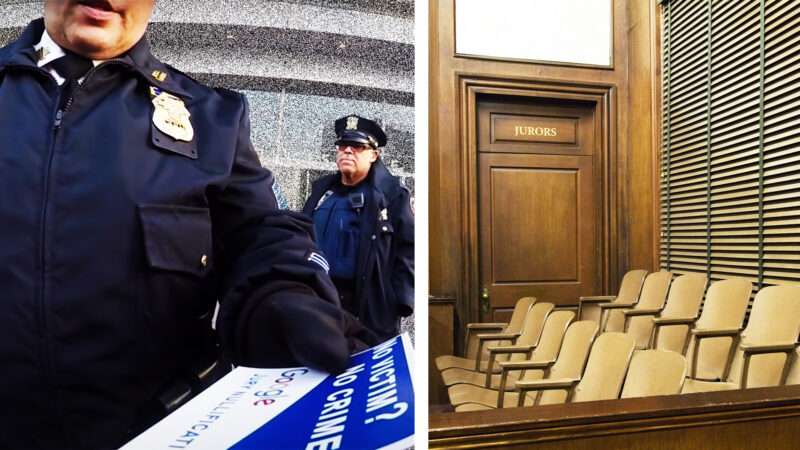
A man was wrongfully arrested for standing outside a Bronx courthouse handing out flyers about jury nullification, the practice where juries render “not guilty” verdicts despite overwhelming evidence of guilt, a federal court confirmed last week.
Michael Picard, a civil libertarian activist, was taken into custody in late 2017 after police took issue with him passing out papers telling recipients to “Google Jury Nullification,” as law enforcement alleged he was in violation of a New York law barring people from standing within 200 feet of a courthouse “calling for or demanding any specified action or determination by such court or jury” in connection with an ongoing case.
But Picard was not referencing a specific trial when he was arrested. He was referencing a general tactic he sees as a bulwark against government overreach. “There are unjust laws,” he says. “This is a tool that a jury or a juror can use to express their disagreement with [those] law[s].”
Put differently, Picard was not trying to sway a jury panel to vote one way or the other in finding a particular defendant guilty of, say, murder, which most people would agree is not an unjust law and should be adjudicated based on the facts at hand. He was simply exercising his right to tell the public about a tactic that can be vital to preserving liberty and pushing back against prosecutorial zealotry. So, in arresting and booking him for promoting the general concept of jury nullification, the state violated the First Amendment, according to the U.S. Court of Appeals for the 2nd Circuit.
“An injunction prohibiting the application of NYPL § 215.50(7) in the circumstances presented by Picard’s case—in which a single individual advocated for what he contends are the correct principles of the legal system,” wrote Judge Gerard E. Lynch, “unconnected to any specific trial and effected through non-intrusive and non-disruptive leafletting rather than more aggressive, disruptive, or targeted forms of communication— would suffice to vindicate Picard’s First Amendment right to advocate his point of view regarding jury nullification and to engage in the conduct in which he has engaged in the past and intends to continue in the future.”
Jury nullification has been the subject of spirited debate among attorneys and legal scholars. One such brouhaha concluded in December 2019 after a federal judge was rebuked by a divided 2nd Circuit—the same court which heard Picard’s case—for telling prosecutors and a group of defense attorneys that a particular case before him “call[ed] for jury nullification.”
In that case, the federal government had locked in “child pornography” charges against a 31-year-old man who filmed his sexual encounter with a 15-year-old Connecticut girl. The clip remained private. But since the video equipment was made outside of the state of Connecticut, federal prosecutors used that loophole to tack on the porn charges—with a 20-year mandatory minimum—on top of the state’s statutory rape case. “I am absolutely stunned that this case…has been brought by the government,” Judge Stefan Underhill said in court.
Core to the ruling concerning Picard’s case, however, is that the New York law in question is not unconstitutional on its face—a departure from the conclusion that the lower court arrived at. “The State would clearly have a compelling interest, for example, in prohibiting protests outside a courthouse featuring amplified calls for the jurors to reach a particular verdict in an ongoing trial in that courthouse that are audible inside the courtroom,” wrote Lynch.
That may be fair enough. But a dissenting judge points out a rather obvious problem with the conclusion: What did this ruling actually rule on? What action exactly is constitutional now that previously wasn’t?
“The majority’s language leaves it unclear what constitutes ‘Picard’s conduct in this case.’ Is the conduct exactly what Picard was doing when arrested―holding the same sign and distributing the same literature, or is it uttering any words or distributing any literature advocating jury nullification, or is it uttering any words or distributing any literature outside a courthouse?” asks Judge Jon O. Newman. “As for location, is the conduct standing exactly where Picard stood when arrested, or any location within 200 feet of the courthouse near which he was arrested, or any location within 200 feet of any courthouse in New York State?”
Picard says he’ll be back to his advocacy now that the case has concluded, though it remains to be seen how the government will answer the above questions.
The post He Was Arrested for Promoting Jury Nullification. A Federal Court Says That Was Illegal. appeared first on Reason.com.
from Latest https://ift.tt/VoHSNXz
via IFTTT